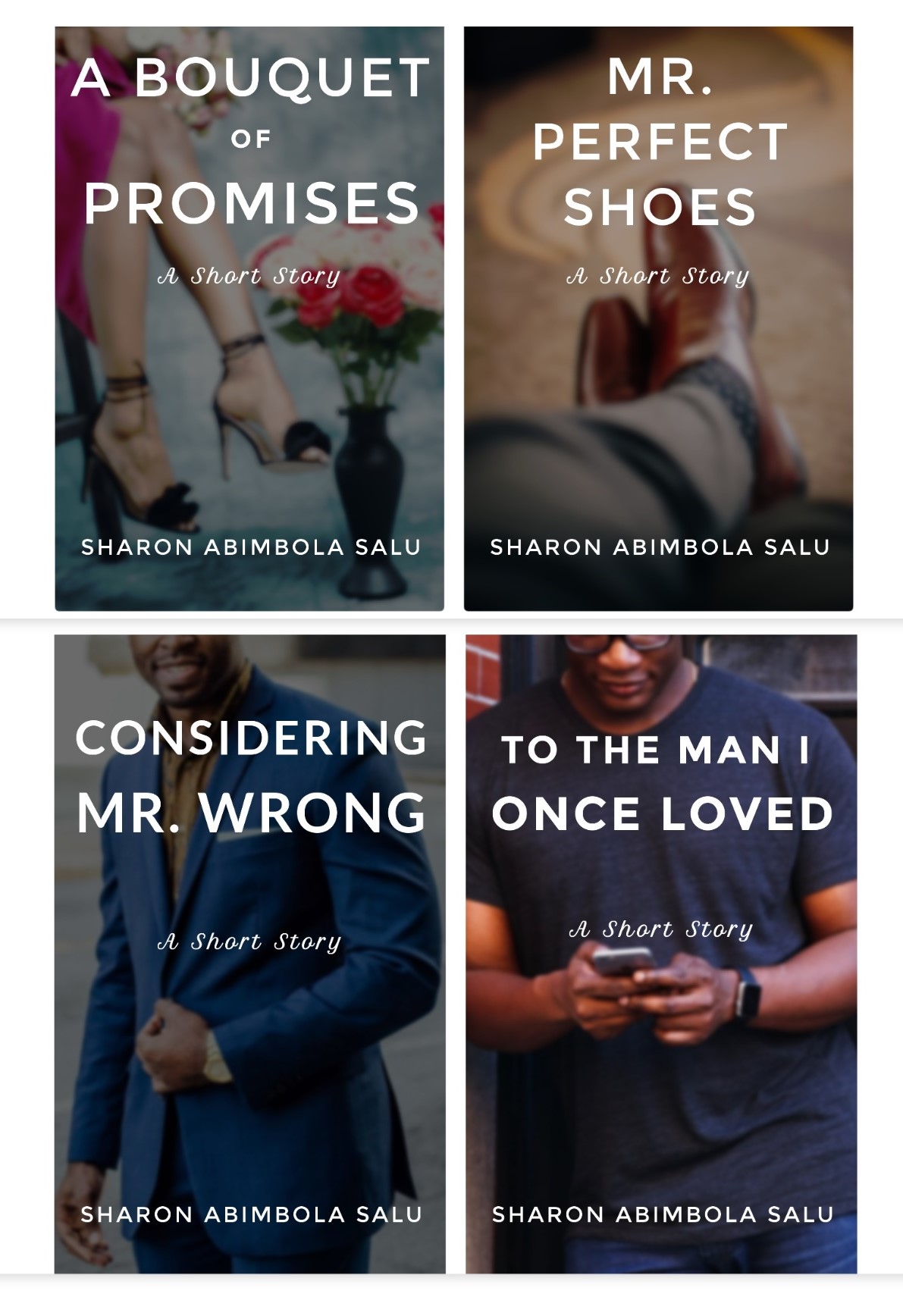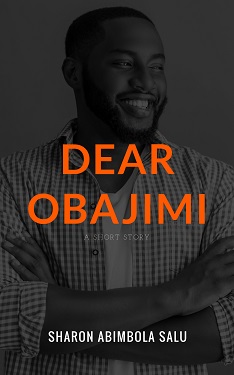
Happy Tuesday!
CONSIDERING MR. WRONG is our third September Short Story. It’s the story of the relationship between Ronke, a Lagos Fashion Designer and Duro, who runs one of his father’s enterprises: a shipping company.
If you missed the first two stories, here they are:
2nd: MR. PERFECT SHOES
And … Number 3 has landed. Ghen ghen! 😀
Enjoy!
CONSIDERING MR. WRONG
In the beginning, Duro was perfect.
Almost perfect.
He was charming, loving, faithful. Everything Ronke wanted in a man, and so much more. But in time, the charm wore off, his love for her was questionable, and so was his fidelity.
But in the beginning, it wasn’t so.
Two weeks before she met Duro, Ronke had gone to her shop as usual. Her shop was the bottom flat of a two-storey building in Lawanson. The sign outside read “Ronke’s Fashions.” Ronke had quickly discovered that when a typical Nigerian sees the word “fashions” hanging above a commercial establishment, the phrase “a tailor works here” springs to his mind.
However, Ronke was not a tailor. She was a fashion designer. That distinction did not stop clients from calling her an ordinary tailor, even though she knew there was nothing ordinary about being a tailor or a fashion designer. In fact, they would have been shocked to discover that her sewing skills were rudimentary. The person who actually sewed fabrics together was Evelyn, her seamstress. And although he did not make suits or coats, the real tailor was Rasaq. He was the master of repairs and alterations.
Ronke was the one who dreamed, drew and created original designs and coordinated her team to transform those designs into wearable apparel. She had learnt in two years of running her own business that her “team” did not have to exist under the same roof. Lagos was bursting with talent, and she knew where to source skilled hands for specialized tasks like hand beading, when the need arose.
But to most of her customers, she was just a tailor.
There were days when it took extra effort to restrain herself from screaming at clients who felt she was only good for making alterations, and copying other people’s designs. Those people neither wanted nor cared for her original designs.
Mrs. Akintunde was one of such clients. She was a round, bossy woman who owned two major supermarkets in Ikeja and Falomo.
On a hot Thursday afternoon, she strolled into Ronke’s shop.
From the onset, Ronke did not like the woman, with her condescending, overbearing manner. But experience had taught her that she did not need to like or love her clients. Her duty was to deliver quality services in a professional manner.
Mrs. Akintunde came into Ronke’s shop dressed in a gaudy lace and organza number that looked hastily thrown together. She ran an experienced eye over the outfit and the words “poor finishing” echoed in her mind.
However, out of courtesy, all she said to Mrs. Akintunde was:
“Good afternoon, ma. How may I help you?”
“Where’s your madam?” Mrs. Akintunde blurted out without giving Ronke a second look. Her eyes roamed all over the shop taking in the shabby décor and assemblage of second hand furniture. Ronke read the verdict of Mrs. Akintunde’s unwelcome assessment in her eyes.
Struggling tailor.
The inside of Ronke’s Fashions screamed “struggle” so loud Ronke felt everyone could hear it. But it was all in her head.
“Are you deaf? I said where’s your madam?” Mrs. Akintunde barked. This time she eyed Ronke from head to toe, before letting her eyes travel to the back of the shop. No doubt, she expected a “Madam,” an older woman who looked like she was in charge, to emerge from a dingy back room and claim ownership of the shop.
Ronke was used to this level of rudeness from potential clients. By default, they assumed that she was the assistant, not the owner. On many occasions, she had received this type of treatment especially from older women.
In an effort to resolve what she saw as a problem, Ronke had once tried Madam-ing herself: dressed herself in the kind of clothes people expected shop owners to wear. But it didn’t work. She finally came to accept that her age was not a detriment.
Nobody expected a woman in her early 20s to own a Fashion House.
She never really made peace with these rude, ignorant comments, but she had learned to tolerate them.
Ronke greeted Mrs. Akintunde’s question with a low chuckle.
“You’re looking at her,” she finally said with a smile.
The look of surprise on Mrs. Akintunde’s face was quickly replaced with one of disdain.
“You? A small girl like you owns this place?” she asked incredulously.
Resisting the urge to spit in her face, Ronke forced a smile.
“By the special grace of God, ma.” And then, to end that line of interrogation, she quickly added, “What outfit did you have in mind? Gown? Skirt and blouse? Jumpsuit? Iro and Buba?”
Although she has perused through general categories, Ronke marveled at the wide range of possibilities within each category. No two gowns were equal. One could make a woman look mama-ish and another could make her look like a sweet sixteen.
Still eyeing her with distrust, and after making another comment about how her last born was older than Ronke, Mrs. Akintunde pulled out a glossy magazine cut-out, which had been ripped out from the center without the aid of a pair of scissors, and practically shoved it into Ronke’s face.
“I want this style in two weeks,” said Mrs. Akintunde.
Ronke scanned the style with careful eyes. This was not a “2-week rush order” style. She was not even sure her team could pull off the intricacies of that design with their skill level.
“Two weeks? What’s the rush, ma?” Ronke asked.
“My sister’s fiftieth birthday is in two weeks. My regular tailor, Baba Teslim had a family emergency. His father or uncle, can’t remember which, fell from a palm tree. He has traveled to his hometown for one month and locked up his shop. My other two tailors can’t get my dress ready on time. So, I asked one of my friends for a good tailor and she recommended you.”
Ronke fumed. She itched to give this woman the “I am a fashion designer not a tailor” speech, but decided against it.
Why? Because when you’re running a business, you become anything and everything necessary for the business to run smoothly. If Mrs. Akintunde needed a tailor, she would get one.
Besides, most of her clientele were people who literally walked off the street looking for a tailor. As far as they were concerned, the sign above her shop which read “Ronke’s Fashions” simply meant there was a collection of sewing machines and skilled hands attached to people who could transform any style, no matter how wild or impossible, into reality, for a reasonable fee.
In that regard, Mrs. Akintunde was a typical customer. Instead of arguing with her, Ronke said:
“It’ll cost you extra, ma,” and held her breath, expecting Mrs. Akintunde to walk out of her shop in a cloud of anger.
But the woman asked: “How much extra?”
Ronke mentioned a figure.
Instead of putting down a deposit with the balance to be paid on completion, Mrs. Akintunde opened her purse and counted several thousand naira notes. Ronke counted it. It was her full payment. She was shocked, but quickly said:
“Let me get my tape rule.”
She took Mrs. Akintunde’s measurements, took the wine lace material from her, and watched as the woman left.
Before she left, however, Mrs. Akintunde asked:
“Why is this place so hot? Don’t you have a generator?”
Ronke chuckled. She did have one, but it had no petrol in it. But seeing as everyone else on her street has their generators off, and there was light, that was not the real problem.
A PHCN official who she had refused to date, sent one of his employees to climb the pole, and cut her line. To reconnect, she had to pay. That was the real reason why her shop was hot.
But she couldn’t tell Mrs. Akintunde that long story. Instead she said:
“I’ve sent someone to buy petrol, ma.”
That answer satisfied Mrs. Akintunde. After giving her a date and time to return, Ronke waited for Evelyn and Rasaq to come back from their lunch at Mama Jollof, a local buka. As soon as they arrived, she took a taxi to the bank, and then the PHCN office.
“Thank God for Mrs. Akintunde,” she said, as she watched them reconnect her line.
* * * * *
Two weeks later, Mrs. Akintunde returned to pick up her outfit. It had taken a lot of late nights, and calling in some favors from another seamstress, but it was finally done.
When Mrs. Akintunde and her condescending stare sashayed into Ronke’s shop, she was not alone. Following closely behind her was a tall, muscled young man wearing dark shades. He was wore a well-tailored suit, the perfect complement to his handsome face.
The young man flashed Ronke a cheeky grin.
“Du-ro–” began Mrs. Akintunde. Ronke thought she was talking to her and said:
“Ma? You want me to wait for–” said Ronke confused. Mrs. Akintunde rolled her eyes. Mr. Shades burst into laughter.
“I meant him,” said Mrs. Akintunde jerking her head towards Mr. Shades.
“Oh, sorry ma,” said Ronke embarrassed.
“I’m Duro,” said Mr. Shades, extending a hand to Ronke. “Durodola Akintunde.” Ronke shook his hand.
“I’m–” Ronke began.
“She’s Ronke, the tailor,” Mrs. Akintunde interjected.
She can’t even let me introduce myself. What kind of person is this? Ronke thought angrily.
“I’m a Fashion Designer, actually,” said Ronke.
“Cool. What’s the difference?” said Duro.
“Duro, I was going to say you could have waited in the car. There was no need to come with me,” said Mrs. Akintunde.
“Come on, Mum,” said Duro. “It’s no bother. Besides, I’m sure Ronke here doesn’t mind me looking around during your fitting.”
Ronke shook her head.
Mind ke? Why would I mind this … this tall drink of water poking around my shop for a bit? If he wants to spend the whole day sef, no wahala.
“I don’t mind at all, at all,” said Ronke decidedly.
“Okay. Where’s my dress?” said Mrs. Akintunde.
Ronke went to her workshop in the back to fetch Mrs. Akintunde’s dress. The whole time she was gone, all she could think about was Duro and his naughty smile.
Mrs. Akintunde tried on the dress. She liked it, but wanted a second opinion. So, she went back to the reception area where Duro was sitting down leafing through a men’s fashion magazine.
As soon as his mother and Ronke stepped into the room, he rose to his feet and tore off his sunglasses.
“Fantastic!” he said.
“You think so?” said Mrs. Akintunde. “I thought it was just okay.”
“Mum, that dress is fa-ya! You look sweet,” said Duro, kissing his fingers. For the first time that afternoon, Mrs. Akintunde smiled. So did Ronke.
“You have a beautiful smile,” said Duro looking directly at Ronke.
Ronke was about to say “thank you” when she caught a glimpse of the scowl on Mrs. Akintunde’s face and quickly decided against it. Instead, she smiled her thanks.
“This dress needs some adjustments,” said Mrs. Akintunde haughtily.
“Okay, ma.”
Ronke took her to the back of the shop, took note of the adjustments and told her to pick it up the next day. Before they left that day, Duro got her number and promised to call.
He did. That evening, while they sat eating shawarma, he told her that his father owned four business enterprises. Duro managed the shipping company.
That was the beginning of their relationship.
Ronke would come to thank God for that opportunity to serve Mrs. Akintunde because it turned out to be what opened the door to even bigger opportunities for her.
Mrs. Akintunde visited Ronke’s shop from time to time for more tailoring commissions, but she also passed her information on to several of her well-placed friends, who saw the outfit and kept pressing her to give them “that amazing tailor’s number.”
From then on, Ronke’s business thrived, and she was able to hire more people and streamline her business to run more efficiently. Her original designs were worn by celebrities, dignitaries, people who mattered, and she created clothing collections, which were showcased on runways across the continent.
Meanwhile, as her career blossomed, so did her love life … up to a certain point. They started dating officially one month after the initial meeting at her shop, and their relationship lasted a little over four years.
From Ronke’s perspective, they were headed for the altar. Duro took her on road trips (never on a plane), bought her gifts, took her to fancy restaurants, spent quality time with her. In short, he did all the things a loving, attentive boyfriend would do.
And because Duro was doing all the things she wanted him to do, Ronke turned a blind eye to all the things he did that made her uncomfortable. Or at least all things he did that a man in a committed relationship, a serious boyfriend, should not do.
And there was a whole list of things Duro did that annoyed Ronke.
At first, she complained.
“Duro, must you stare so hard at these girls? Ahn ahn! And I’m standing right here? In a few seconds, I’m sure we’ll need a rag to wipe your drool off the table,” she protested one day.
“I like to appreciate fine, fine things,” he replied. “And those girls are hotttt!”
“So is fire,” said Ronke and hissed. She let it slide. The last thing she wanted was to be called a nag, but seeing Duro gawking at women really bothered her. After all, she was his girlfriend. Wasn’t she enough?
If that was Duro’s only vice, Ronke could have endured it. But there were others.
Duro went beyond mere lookery and proceeded to touchery. Whenever Ronke visited him at his apartment or the office, it was the rare occasion indeed when there weren’t four or five young women waiting for him. On a few occasions, one of them would be perched on his laps as if there weren’t enough chairs in the room.
But it was the way these other women assessed her, the way women assess rivals, not to mention the suggestive dressing that led her to conclude that they were there for pleasure, not business.
“Don’t you have male friends? Why is it always women you hang out with?” she asked him one day.
He just shrugged. “They’re my friends.”
“How would you like it if you came to visit me and found three guys wearing tight boxers just chilling at my place? Why are you acting as if this is okay?” said Ronke.
“They’re just friends, Ronke. Relax,” said Duro.
“So I have to catch you messing around before I lose my cool, abi? Don’t insult my intelligence. I’ve seen those girls. They’re not just looking for friendship and I suspect, neither are you,” said Ronke.
“Ronke, stop this nonsense immediately,” Duro shouted. “You can’t dictate who I hang out with or … or … who my friends are, or … or … what I do with them. I’m an adult for goodness sakes.”
“Really? I mistook you for a rebellious teenager,” she hissed. “Even ordinary dancing with other women, you grope and … it doesn’t matter to you. It’s like you have no respect for me.”
“Look, if you don’t like what I’m doing, there’s the door,” said Duro.
Ronke almost called it quits that day. But she convinced herself that Duro was a prize and she was lucky to have him in her life. Besides, he did have a point: she hadn’t actually caught him in bed with another woman. But did it have to escalate to that point to accept what was happening?
“Of all the women in the world, he chose you. That has to count for something, right?” she told herself.
That explanation worked until … it didn’t.
She enrolled in a 3-month fashion design course in Milan. Since she would be gone for a while, she wanted Duro to define his commitment to her. So, she called a meeting.
“Duro, when are you going to introduce me to your parents?” said Ronke.
It was not the first time she had asked him this question. But this time, she wanted a definite answer. No more excuses.
“Why do you want to meet them? You’ve met my mum–” he began.
“Yes, but not your dad. Since we started dating, you’ve never formally introduced me as your girlfriend,” said Ronke. “Do they even know about us?”
Duro laughed a silly kind of laugh that made Ronke want to give him a dirty slap. But she restrained herself and listened to him.
“My parents, the ones you so desperately want to meet, are the reason I haven’t formally introduced you,” said Duro.
“What do you mean?” said Ronke.
“You’re a fashion designer. In their eyes, that’s a glorified tailor. They would never let me marry you. They want me to marry someone in a more … what’s the word? Noble. Yes, someone in a more noble profession. You know, lawyer, doctor. Someone who wears a suit to work.”
Ronke stood there dumbfounded. For a whole minute, she did not say a word.
“Oya, say something now,” said Duro.
“So you knew all this, and for four whole years you wasted my time. I kept asking when I would meet your parents, but you were ready with excuses. Oh, they’ve travelled. Oh, they’re busy with work. Oh, Mum is ill … bla, bla, bla. It is now you know that I’m not good enough for you, abi? All these years, I put up with your rubbish. For what?” said Ronke.
“But we got to know each other. It wasn’t all–” said Duro.
“Shut up, Duro!” Ronke roared. “Not another word. You know what? You’re right. We did get to know each other. I know enough now. I know you’re an unrepentant womanizer, a time waster and an altogether useless human being. It is God who will punish you, you hear?”
That was how Duro went from boyfriend to ex.
* * * * *
Two years later, while vacationing in Accra, Ronke sat on the patio of a restaurant. After placing her order, she sat and waited.
A black Mercedes pulled into a parking spot not far from where she sat. Out stepped a tall man wearing sunshades. With the push of a button, he locked and armed the car, and took confident steps towards the restaurant. As he approached, he seemed to look straight at her, but she could not see his eyes from behind his shades.
When he was just a few feet away from her, he pulled off his shades. Ronke almost screamed. She knew that face. From the look of surprise on his face, so did he.
“Ronke? Is that you?” he said, coming closer.
“Duro Akintunde? I don’t believe this.”
Indeed, it was the same Durodola Akintunde who broke her heart two years before.
But he seemed changed. More serious, more responsible and overall just … different. Ronke began to wonder.
Maybe I rushed things. Maybe, just maybe he has changed.
With that thought at the back of her mind, they chatted and caught up on old times. The entire time he spoke, she struggled to remember why they had broken up in the first place. Because this Duro seemed like a whole new person.
Until …
Two women walked past on their way into the restaurant. Duro stared and stared and stared. Before they went indoors, he got up and introduced himself to them. She watched as he complimented their outfits and got their numbers.
Before he came back to the table, she watched him flirt with a waitress.
It was then everything came flooding back and the reality dawned on her. Duro had not changed. Perhaps, he would never change.
When he returned from his extended flirting with the waitress, he said:
“So, what about those drinks? Tonight at seven?”
“No. Never.”
And Ronke got up and walked away, leaving her lunch and Mr. Wrong behind.
* * * * *
Exactly one week later, she was back in Lagos. That Friday night, she went to friend’s birthday party.
As she stood waiting for the music to change, a cute guy walked up to her.
“I hope you’re not planning to stand and watch all night,” he teased.
“No. I was waiting for–” she began.
“Me. You were waiting for me,” he said.
“Yes,” she said laughing. “It was you.”
They danced, and talked, and danced some more. By the end of the night, they still had more to talk about. Dates were arranged. Days turned to weeks and weeks turned to months.
And before six months was up, they both knew. He was the one she had been waiting for. She was the one he had been waiting for.
Raymond was her Mr. Right.
###

September Short Stories
* * *
Also, check out the August Fiction Series:
At the End of a Long, Loose Braid









Beautiful piece.
J.Benson: Thank you so much! ☺️ I’m glad you liked it.